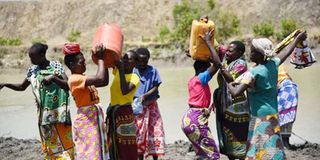Adopt water trapping ways to end shortage

Women fetch water at an almost dried up water pan at Bora Imani in Magarini, Kilifi County. What is needed is to hire agricultural extension officers who have direct contact with grassroots communities to give them hands-on skills on water recycling, conservation and domestic food production. PHOTO | KEVIN ODIT | NATION MEDIA GROUP
What you need to know:
The reason given for the unfolding tragedy is rain failure — our pet scapegoat.
Kenya and Israel have had relations since Independence, culminating in an exchange of ambassadors in 1994.
For the ‘nth’ time since independence, Kenya is in the throes of devastating hunger, with the Saturday Nation recently raising the looming disaster to Page One status and according it in-depth treatment.
The reason given for the unfolding tragedy is rain failure — our pet scapegoat.
Once we wave the rain failure banner, we shift blame to natural disaster to salve our national conscience of the many sins of omission and commission that have solely brought upon us the needles water and food crises.
Water is key in food production and, by extension, food security. It, therefore, follows that when rains fail food shortage, and even famine, should follow.
That is the narrative Kenyans have been treated to, ad nauseam, and featured prominently in government explanations on why we are often held hostage to the vagaries of weather.
DROUGHT SIGNS
It is pathetic of Devolution Cabinet Secretary Eugene Wamalwa to tell Kenyans that the “government has been responding (to the current situation) on a continuous basis since July 2016 when drought signs were reported”.
Truth be told, Kenya’s perennial dependence on rainfall to drive agriculture is paradoxical. It is as if we have failed to learn from our vast exposure to one country that has surmounted its desert conditions to become an exporter of surplus food: Israel.
Kenya and Israel have had relations since Independence, culminating in an exchange of ambassadors in 1994.
In 2009, the two countries signed an agreement on water resource management, technologies, irrigation and capacity building. While 10 years may not be long enough to gauge the gains from this deal, Kenyans’ exposure to the ‘Israeli miracle’ is older.
Training Kenyans in the fields of agriculture, education, irrigation development, water management, aquaculture and environmental protection has been a major aspect of Kenya-Israel technical cooperation, raising the question: What have Kenyans gained from their numerous visits to Israel?
Ordinary folks’ travels may not translate to policies to turn Kenya’s arid and semi-arid lands into bread baskets. However, top government officers have not been missing on the Israeli bandwagon.
HIGH-PROFILE TOURS
High-ranking officers have been to Israel since President Daniel arap Moi’s official visit to the Middle East country in 1994. Then-Fisheries Development minister Paul Otuoma was on the trip.
President Moi also attended the 5th International Water Technologies meeting in November 2009.
Also to tour Israel was a former Agriculture minister, and current Deputy President William Ruto.
Also, as Water and Irrigation minister, Kitui Governor Charity Ngilu, accompanied Prime Minister Raila Odinga to the highly strategic International Exhibition and International Conference on Water Technologies, Renewable Energy and Environmental Control.
When President Uhuru Kenyatta visited in 2016, he had the clout to help us tap into the Israeli success story as the global leader in water conservation and arid-land farming technologies.
Last November, Controller of Budget Agnes Odhiambo revealed that a whopping Sh27 billion was spent on local and foreign travel the previous financial year.
But why can’t the billions of shillings being wasted on trips be used to trap the vast amounts of water that drain into the Indian Ocean every year, to irrigate small patches of land that have a direct impact on families’ welfare, not grandiose money-guzzlers like Galana-Kulalu?
What is needed is to hire agricultural extension officers who have direct contact with grassroots communities to give them hands-on skills on water recycling, conservation and domestic food production.
Ms Kweyu is a freelance writer and consulting editor. [email protected]





